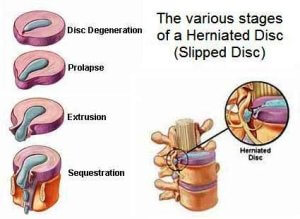Slipped Disc Symptoms

The most common of the Slipped Disc symptoms is back pain. It can occur due to lifting a heavy object incorrectly or from trauma. Ageing also plays a role in the development of a slipped disc, as the elasticity of the disc decreases with age. Other risk factors include sitting for long periods of time, injury to the spine, or genetic predisposition. However, slipping discs are not as common as they may appear, and most people recover fairly quickly with the appropriate treatment.
The first and most common symptom of a slipped disc is sciatica, a pain in the lower back that radiates down the leg. Sometimes, low back and neck pain are present as well. The irritated nerve can cause crooked posture or a powerful muscle guarding that makes standing upright difficult. A doctor can perform a CT scan or MRI to diagnose and treat a slipped disc.
The next symptom of a slipped disc is discomfort. The displaced soft tissue compresses the spinal cord and sensitive nerve roots in the area. The location of the damaged disc affects the severity of the symptom. If a slipped disc occurs in the lumbar spine, the pain will be felt in the buttocks. The slipped disc can also cause numbness, tingling, or weakness in the arms and legs.
When you experience a slipped disc, your pain will likely begin or increase when you move. You may experience pain as a result of walking, bending, or sitting. Your doctor may recommend rest and nonsurgical methods. You may use over-the-counter pain relievers like acetaminophen or naproxen. You may also perform strengthening exercises and stretch your muscles to help relieve the pain. Your physician will likely recommend a physiotherapy or physical therapy treatment.
Depending on the severity of your slipped disc, you may be able to manage the symptoms without surgery. If your slipped disc is severe, it can cause permanent damage to your nerves, making it difficult to stand or walk properly. As a result, you should see a doctor right away for a diagnosis. You should also consult your doctor if you’re experiencing pain in the neck or lower back. If you’re suffering from a slipped disc, it’s important to take action immediately.

The most common symptom of a slipped disc is sciatica. If the slipped disc is in the neck, the pain may radiate into the arm. Besides pain, you may experience other symptoms such as numbness and crooked posture. Your doctor will perform a nerve-damaging electromyogram in order to confirm the diagnosis. The worst part of a sprained disc is the loss of bladder and bowel control.
Disc displacement usually starts or worsens with weight or pressure on the spine. You can relieve pressure on your spine by lying on your back with support on your knees or by sitting in a reclining chair. It is important to stay active after a disc slip to avoid further damage. If you are unable to exercise, consider taking up light exercise such as swimming or walking. This can help you get back to your normal daily routine and prevent more serious problems in the future.
The most common symptom of an intervertebral disc is sciatica. If the disc displacement occurs in the neck, the pain may radiate to the arm. You may also experience pain in your neck or lower back. An irritated nerve causes a twisted posture and soreness of the protective muscles. You may not be able to stand or sit straight for a long time after a traumatic injury.
In most cases, slippage of the intervertebral disc improves within a few weeks. The tissues protruding onto the nerve are in most cases reduced. A general practitioner will be able to address the underlying cause and provide treatment for the symptoms. In many cases, the pain associated with a herniated disc does not last more than a few weeks. In most cases, this goes away on its own after a few weeks, although it is still necessary to see a doctor if your condition worsens.
If you are experiencing signs of a slipped disc, you should see your doctor as soon as possible. Pain often results from leakage of disc material, which irritates nearby nerves. Nerves often become numb or sore in the neck and legs. If you have a herniated disc in your neck, the herniated disc may also affect your arm and shoulder. If you are concerned about a slipped disc, contact your primary care physician or health website immediately goldensoft.co.th.


